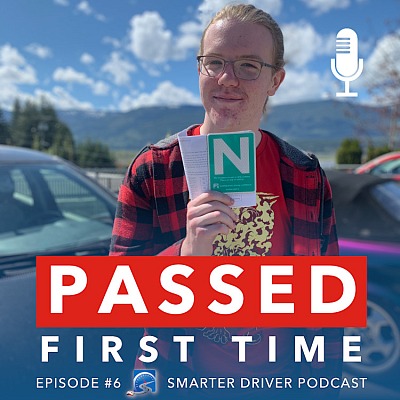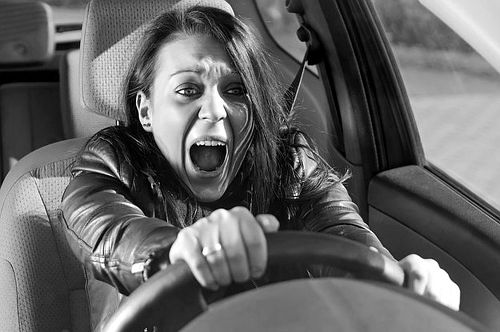Will increased police powers stop distracted driving? The Textalyzer may offer a solution.
Textalyzer | Distracted Driving
Introduction
The Textalyzer is proposed legislation in New York State that would give police the ability and the tools to determine if you are texting and driving
The Textalyzer, if is passed into law in New York State, will catch on like wildfire - absolutely no doubt
The GDL program - the Graduated Driver's Licensing - program - that was passed in 1987 in New Zealand saw the same thing
It caught on like wildfire.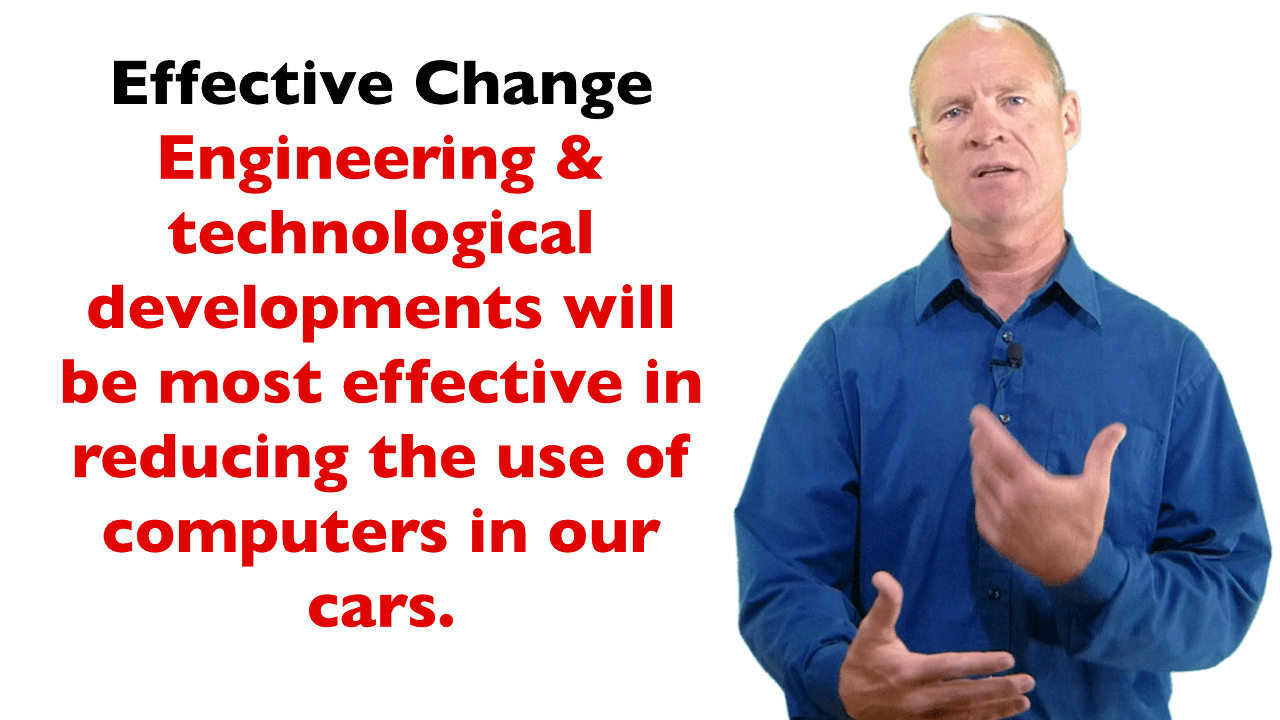
By the beginning of the 2000s, every state and province in the G20 nations had a GDL program in place
As well as hands-free cellphones - most of the states in the United States have hands-free legislation and Canada and other industrialized countries in the world also have hands-free legislation and laws that prevent you from using a hand-held cellphone.
I'm going to argue in this video that it is not going to be proposed legislation and laws and greater enforcement that are going to deter distracted driving as it's called and I'm also going to talk about definitions of distracted driving because I don't believe that talking on a cell phone and all of the other things that can cause you to be distracted during driving are one in the same thing
I believe that distracted driving and talking on your phone or using your phone to browse the internet or social media sites is something different and in a very different category.
So I'm going argue that in fact it's not going to be laws and education and changing people's behaviour that's going to reduce the amount of distracted driving on our roadways, but rather it is going to be engineering and other technological advancements that's going to change distracted driving and drivers' behavior in terms of keeping us safe on our roadways.
The Textalyzer
The Textalyzer moves to reduce distracted driving by giving police tools and increased powers to determine whether you are texting or using your cell phone while driving
The first thing I want to do is - I want to define - I want to talk about distracted driving
And I had a little bit of difficulty with the definition of distracted driving and lumping the use of cell phones into distracted driving
Because I think using a cell phone and driving is a very different category from all of the other things - you know - listening to music, using your GPS, eating, putting on mascara, shaving
All of those things that are distracted driving - yes you're distracted, but I think that talking on your cell phone is something very different
The other thing that is problematic - in terms of distracted driving and using your phone while driving - is the parallel between the Textalyzer and the Breathalyzer.
Same Penalities as Breathalyzer
And there's absolutely no coincidence in the fact that authorities and other interested parties that are pushing to get the Textalyzer in place are making a direct parallel between drinking and driving and texting and driving
And those two things, in terms of what happens to the human body, are completely different
You are inebriated when you are drunk; your ability to perform physical functions and mental and cognitive functions is reduced when you drink alcohol.
When you are driving and texting, many people are under the false assumption that they can multitask and do two things at one time
When the reality is that we as human beings CANNOT multitask
And it has been shown by psychology that human beings have the inability - in other words - they cannot, in fact, multitask
It's like our vision, we can't look at more than one thing at a time
We have a central vision and we have peripheral vision
For most of us our peripheral vision is hundred and eighty degrees
Our peripheral vision is attracted to light and movement
And when our peripheral vision is attracted to light and movement and we move to look at it - to focus in on something for example - it's our central vision
Our central vision is only about that much at arm's length; it's not very big of a space at all.
And our ability to focus in on one task cognitively is the same thing when we're driving
We cannot focus on a phone call, we cannot focus on looking on the internet or texting or whatnot and concentrate on the task of driving
So texting and driving and drinking and driving are two different things in terms of what happens to the body
But the reason that authorities are drawing a parallel between drinking and driving and texting and driving is because they want the same consequences
If you get pulled over and police are granted the authority - the increased police powers of being able to use the Textalyzer - legislators and other authorities want to give police the same powers as they have for drinking and driving.
Implied Consent
And those same police powers are: if you refuse to give your cell phone to police, you have implied consent by the fact that your license is a privilege
And in having a license and having that privilege you have implied consent when you sign the back of your license; you were giving authorities, the government, implied consent that you will consent to a Breathalyzer you will consent to Textalyzer
So the parallel between drinking and driving and texting and driving - there is absolutely no mistake about what authorities are doing
And that is the reason that they're doing it
In the United States, the National Highway Traffic Safety Association has indicated that distracted driving is becoming an epidemic problem.
Increased Traffic Crashes
As well, traffic crashes have increased in the last few years by as much as 8%
Now there is some problem in making that correlation between distracted driving and increased traffic crashes because in the last couple of years fuel prices have been down
And because fuel prices have been down, people have been driving more
So there is..
that could possibly be one explanation for the increase in crashes
Now I'm not negating the fact that distracted driving is problematic.
There was a study done by the triple 'A' - the American Automobile Association - three or four years ago that indicated that 66 percent of Americans admitted to talking on the phone while driving, and 33 percent of Americans - one third of the American population, a hundred million people - admitted to texting and driving
So no doubt, using a cell phone, using a smartphone, and driving it is becoming an increasing problem.
Education, Enforcement, Engineering
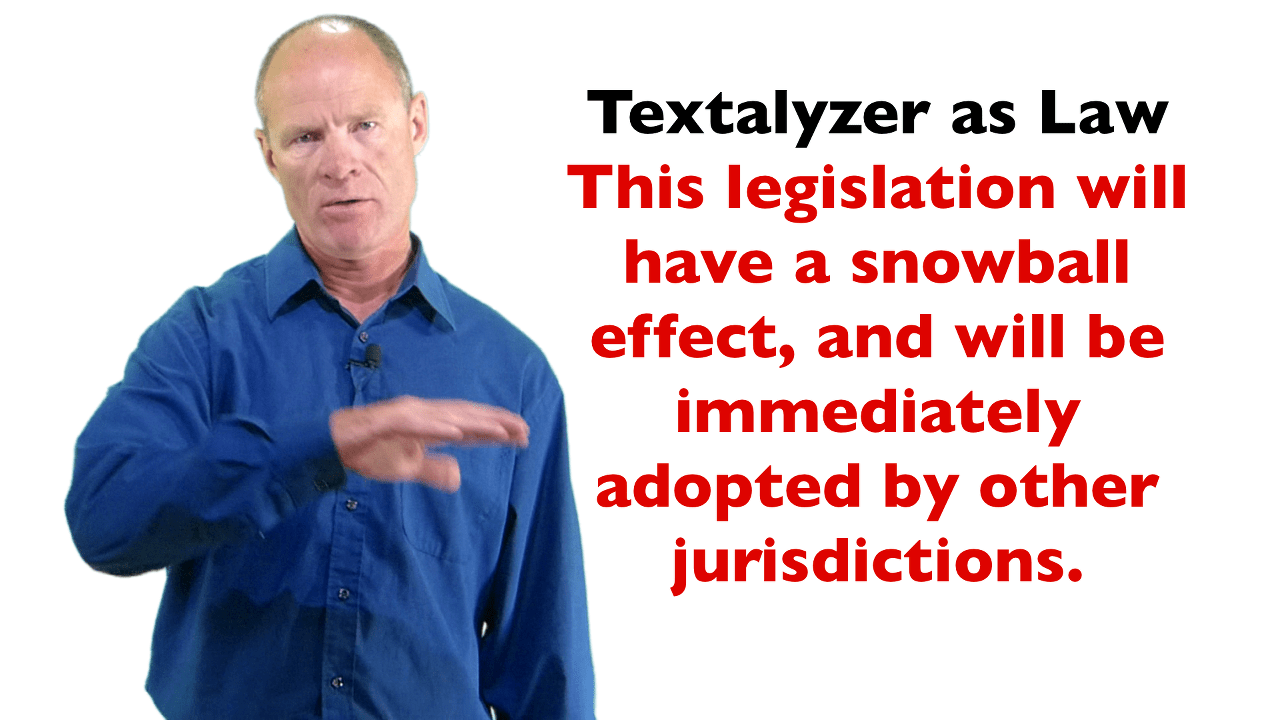 The three tiers of traffic safety are engineering, education, and enforcement
The three tiers of traffic safety are engineering, education, and enforcement
And what we have been trying to do with hands-free cellphones - the first thing we have done - is education and enforcement
We have passed laws to ban the use of hands-free cellphones
We've also given increased police powers to police that
The GDL programs - Graduated Driver Licensing programs - have banned the use of both hands-free phones and handheld phones for new drivers.
So new drivers can't use either or in terms of cell phones while driving
Basically what we've been trying to do in terms of education and enforcement is trying to influence people's behavior while driving
Influencing people's behavior while driving is an incredibly difficult task
In terms of trying to influence people's decision making process on any given day, in any given mood, in any given situation - it is a huge problem.
Because you're trying to influence hundreds of millions of people's decision making processes in any given situation
So enforcement and education have not been as successful as authorities would like us to believe
And as the attempts to influence people's behaviour becomes less and less successful, the "carrot on the stick' - the stick becomes bigger and bigger
Thus, the proposed legislation for the Textalyzer
And if the Textalyzer is passed in New York State, as I said in the introduction, this is just going have a snowball effect, where most of the states in the USA, most of the provinces in Canada and other industrialized countries in the world are going to adapt the Textalyzer or to try and control people using their phones while driving.
The Phone & Carphones
The other thing that's problematic about phones and cell phones is that the historical use of phones
Phones for the last century have been bolted down in our houses
We have used phones in our private space of our house
Phones obviously evolved in the nineties and early two thousands, we got cordless phones and we could move around our houses and whatnot and then we got the first cell phones.
The first cell phones actually, believe it or not, were developed as car phones
They were actually intended to be used in our cars
And so we have this historical idea that phones are part of our house, part of our personal space
And cell phones were used in cars
And the middle class tried to emulate the upper socioeconomic bracket of society
And it was those people who had the first cell phones - the first car phones.
So the middle class obviously emulated to get car phones themselves because it it was a symbol of wealth
And the same thing - a few years ago, my parents generation - the baby boomers - all drove cadillacs
It was a symbol, it was an outward symbol of economic wealth
As was the first car phone
So we have these two things where phones are bolted down in our houses and we use them as a private spaces
And the first cell phones are developed as actual car phone.
Now our car as well, talking about phones being used in personal space, our car is a very personal space and we use our phones in personal spaces
Because driving becomes a secondary task, we look for activities to engage us, to keep us occupied - using our phone, browsing the Internet, taking selfies, being on social media
All this keeps us entertained while doing the secondary task of driving
And we do that in our private spaces
We talk on phones in our private spaces.
Think of the social stigma that we now have attached to cell phones
If you're talking on a phone in a public queue..
everybody's got that look while they're trying to talk on their phone and they're in a public place
This is the reason that texting has become so popular, because texting is private
It's only between you and the person who's on the other end of that text
You can be standing in the same room and texting somebody and somebody else in the same room will not know
However if you're on your phone, people know
So on that point of using phones in private spaces and the first cell phones developed as car phones, it's not surprising that cell phones have evolved where we use them in our cars because a car is a private space
And the first cell phones were developed as car phones, therefore we use them in our cars.
Driving as a Secondary Activity
Because since the motor car was developed, and we have become adept at driving motor cars, after you get some experience driving a car, it is a very secondary activity and we find all kinds of other things to do in our cars to occupy the time - to pass the time
Phones evolved in the private spaces of our houses - the first phones developed as car phones and now phones are not phones
And I think the other problem with phones and the reason that we have a problem with this - with using cell phones while driving - is because we have this association with phones.
It is a Computer!
It is not a phone anymore
It is a computer! I can do everything on my phone that I can do on my computer at my desk
I can browse the internet, I can watch videos, I can text, I can type
The only difference for my phone and an actual computer is that it is a smaller screen and I can't, I dont have a keyboard on my phone
So we need to change the language of smartphones, of iPhones, and Android phones to have these as portable computers and to label them for what they actually are
I believe that if we're able to change the language of phones to computers or some other word that is synonymous with computer that we'll begin to change the epidemic of using cell phones while driving.
Be a Safer, Smarter Driver with these tips & strategies!
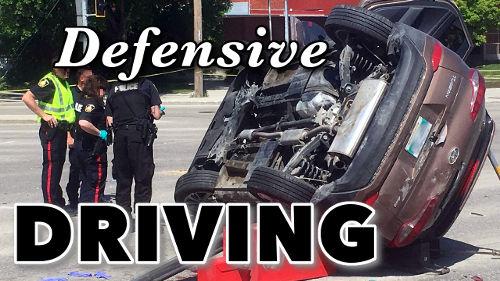
LEARN THE SECRETS THAT DRIVING SCHOOLS DON'T TELL YOU!
• EMPOWERMENT :: Armed with the RIGHT information and attitude you can handle any emergency;
• SELF-CONFIDENCE :: Get the exact skills and abilities to drive anywhere, any time, in any situation;
• CONFUSION :: Cut through the conflicting information to keep you and your family safe;
• QUALIFIED :: Smart Drive Test has helped 1000s improve their driving with a few simple tweaks...
Grass Roots Movements
The other social movement that is moving to change distracted driving is the grassroots movement that is coming out of parents who have lost teenage children in crashes, where other people were inebriated or other people were talking on their cell phones
And this began in 1980 with Candy Lightner who lost her 13-year-old daughter Cari to a drunk driver
She founded MADD, and changed an entire culture of drinking and driving in the last 20 years..
last 25 years and how we perceive drinking and driving
That it has become socially unacceptable to drink and drive
Candy Lightner is also involved in Partnerships for Distracted-Free Driving and has got on board with moving to make it socially unacceptable to use your phone while driving.
In 2006, Tim Hollister lost his son Reid and took aim at the GDL program - Graduated Driver's Licensing program - in Connecticut feeling that it was not strong enough, did not impose enough restrictions and rules and guidelines for new drivers
And that new drivers were at risk, and the government needed to do more and tighten up the GDL program.
Vijay Dixit lost his daughter Shreya to a distracted driver and wrote the book 'One Split Second'
He also brought on board authorities and believes that he has proposed solutions to fix the problem.
And finally Ben Lieberman, who began the organization DORC - Distracted Operators Risk Casualties - and the law that is being proposed in New York State for the Textalyzer is for his son Evan - and it's actually being called Evan's law in memory of Evan who was sleeping in the back seat of a car and was struck by another vehicle that they believe was using the internet on his phone while driving.
This is where enormous pressure is put on the government to tighten up laws to have programs that distract and dissuade drivers from texting, talking on their phones, and driving
So these parents that have lost children and are pushing the government to propose tougher laws ,tougher regulations are moving to treat it like drink driving, to make it socially unacceptable.
Generational Change
That the Breathalyzer and the Textalyzer are one in the same and have the same consequences
That people give implied permission - that if they refuse a Breathalyzer, they refuse a Textalyzer that they can have penalties imposed on them because of their implied consent
Now these social movement, these laws and enforcement and education are not going to be effective right away.
And the example that I use are seat belt laws that came out in the nineteen seventies
Seat belt laws were not as effective as they are today until well into the nineteen nineties
And the reason that seat belt laws were not effective until almost twenty years later was because of the same sort of marketing plan that McDonald's used.
McDonald's targeted their marketing towards children
Children pestered their parents to drag them into McDonalds and it worked
And what happened with seat belt laws - the same analogy - what happened was that children from the nineteen seventies, nineteen eighties grew up wearing seatbelts and finally by the late nineteen eighties and early nineteen nineties were pestering their parents that they too had to wear seat belts
There were other forces at play - don't get me wrong.
It wasn't just a generational influence that brought seat belt use to a high nineties by the early nineteen ninety
There were - you know - those annoying buzzers in your car and whatnot that told you you had to wear your seatbelt and whatnot
But for the most part, it was a generational influence
The generation that grew up wearing seatbelts - being strapped into a car seat, wearing helmets and those types of things that influenced their parents to wear seat belts
And the same thing with texting, talking on cell phones and driving
If we're going to be successful to make it socially unacceptable to talk on your phone and drive, we're going to have to start with the beginning of a generation.
And the problem is is that we now have a generation of people who are growing up - the same as the baby boomers who grew were the first generation to grow up with the motor car; we now have a generation of people who are growing up, and they are the first generation to grow up with the cell phone
Because I'll tell you, I'm a little bit older - I'm not that old, but I didn't get a cell phone until two years ago..
I held out the last.
So if we're going have a movement to make it socially unacceptable to use our phones while driving, it's going to have to start at the beginning of a generation.
Public Safety vs
Privacy
Now the other problem that governments have is that there is a fundamental conflict between privacy and the government's right to protect society
Those two things are coming at a head
And in the United States, the Supreme Court unanimously decided that phones - our computers, our mini-computers - there is privacy & the police and other authorities could not go into your phone without getting a warrant
And only after they got a warrant did they have access to your cell phone records
All of this is right to privacy
And this is one of the things that is probably going to stall the legislation in New York State is the fourth amendment and the right to privacy.
Because the Textalyzer, if police plug into your phone some authorities have already indicated that they're not just downloading information about whether you've used your phone or not, they're actually downloading the contents of your phone
And having access to the context of your phone flies in the face of the fourth amendment and other privacy issues.
Traffic Violations as a Victimless Crime
So as I said at the beginning, what I was going to argue in this video was the fact that we are not in fact going to change people's behavior with education and enforcement
We're not going to stop people from texting and driving, we're not going stop people from talking on their phones because people would rather have a traffic violation than they would for being late or not communicating with somebody that they're going to meet them somewhere else, or they need to pick up groceries or whatever the conversation is that we're having with somebody else.
And it's the same thing with speeding: many people will speed rather than be late for an appointment
Because traffic, many traffic violations are seen like tax fraud or tax evasion - it's a victimless crime
Nobody gets hurt unless there's a crash
And many people, when they drive are optimistic in the fact that they're not going get into a crash, they're not going to get a violation, they're not going to get caught by police.
Statistics have shown that most people who drive in cars only get into a crash once every fourteen years
So most people do not think of their vehicles as being dangerous
It's impossible to sort of think of our vehicles as being dangerous because the risk of a crash happening is minute for most people.
Autonomous Cars
The other proposed solution is autonomous cars, which are beginning to come out as a bit of a novelty in terms of the Google car that drives around without somebody in it
They are autonomous, but the thing is, yes I am all for bringing on the autonomous car
I am looking forward to being transported around in a car that drives itself
The real issue is that that system, that network of having autonomous cars driving around on our roadways is nowhere in the near future
I see that the autonomous car is at least 50 years off.
Not only is the autonomous car at least 50 years off in terms of its technological viability, but also the fact that everybody who's driving around now - what I would label as the traditionalists - who are like, "there's no way I'm give my control over to a machine to drive me around in my car." That is going to come at a real conflict with the traditionalists and futurists of having autonomous cars actually drive us around
So to implement that system is some decades off and is not an immediate solution to distracted driving and talking on our phones while driving.
One of the more immediate solutions for talking on our phones while driving and texting and whatnot is better voice recognition, better voice-to-text software and if we can implement some of that this may reduce some of the distracted driving that we now have and will propose a viable solutions for politicians and other people who are called upon to uphold public safety.
Reduced Traffic Deaths, but Not Injuries or Crashes
Just as a kind of an interesting study, as you may or may not know from watching some of the videos on my channel, my PhD is in legal history, and particularly traffic safety
I have looked at and studied traffic crashes since the late nineteen sixties until sort of the 2000s, and have found that, in fact, traffic fatalities have been reduced greatly; however, cars and drivers are still crashing at more or less the same rate as they were in the late 1960s.
And injuries are at the same rate
People are surviving car crashes more and more and all this is because of seat belt use, better safety features on vehicles, crumple zones in the front, collapsible steering wheels, padded dashboards
Those types of things: better response time to emergency facilities, to hospitals
GPS being able to locate these peoples - locate these injured people and drivers - and get them medical attention and what not
All of this has served to reduce fatalities
People are living longer and crashing the same
So like the ability to reduce the number of fatalities due to better engineering, better safety features on vehicles, and seat belts and whatnot.
The ability to get people to put down their phones and stop texting and talking on their phones while driving is going to be about technological advances
And whether that's autonomous vehicles, better voice-to-text software, so that people can talk and give directions to their phones which is coming on board more and more as smartphones, Androids, iPhone develop
So what's going to happen is going be technology, its going to be engineering that reduces our talking and driving on phones.
Conclusion
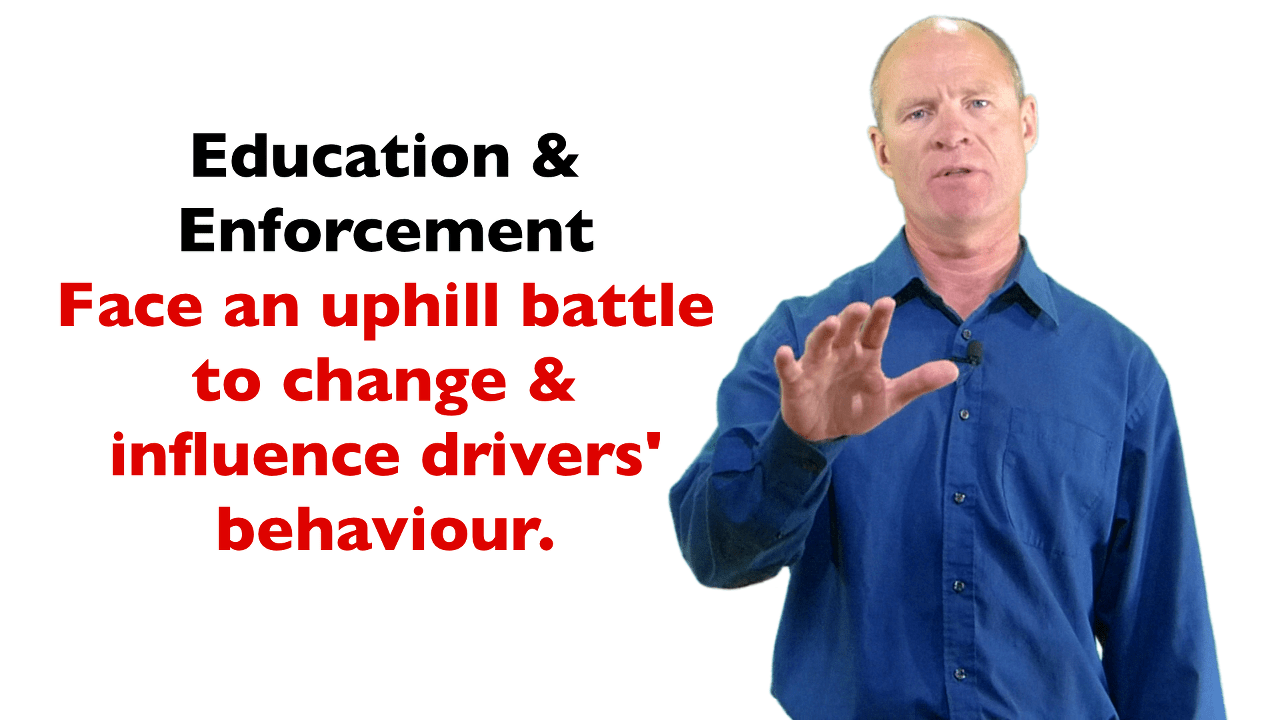 In conclusion, I argued that education and enforcement are not going to influence drivers' behaviour so that they put down their cell phones
In conclusion, I argued that education and enforcement are not going to influence drivers' behaviour so that they put down their cell phones
They're going to continue to text and drive
The Textalyzer, if that legislation is passed in New York State and becomes law, it will catch on like wildfire
All of the industrialized countries in the world will take that on board and pass it into law.
And we will have the Textalyzer and increased police powers that will allow police to plug your phone into software that will determine if you've been using your phone while driving
Now the proposed legislation in New York State says that they can only do it post-crash.
Well that is a bit problematic because the government has to mediate the conflict between privacy and the public safety and which ever one of those out weight the other one will be yet to be seen
But in the United States, you're up against the fourth amendment - the right to privacy
The Supreme Court unanimously decided some years ago that authorities - FBI agents and other people - had to get a search warrant to get access to your cell phone records - to get access into your phone.
And the company that is on board to develop the Textalyzer software, Cellebrite was the same company that the FBI used in investigating a suspected terrorist some years ago and cracked the iPhone.
The other forces at play are the grassroots movement with Candy Lightner, Ben Lieberman, Tim Hollister, and Vijay Dixit, who a couple of these have written books, have founded social organizations - MADD (Mothers Against Drunk Driving) and DORC (Distracted Operators Risk Casualties)
These social movements, and these people who have founded these social movements are putting enormous pressure on public authorities to put in place measures that will protect their sons and daughters and young people.
Because one of the worst things for any parent is to outlive their children
Whether we're going to influence people's behavior in terms of driving on any given day, day in any given situation, in any given mood is not likely going happen
So what I'm proposing is that better software in a voice-to-text recognition software, so that we can talk and text and this technology will come about in the next couple of years
It's also been proposed that autonomous cars will reduce crashes due to distracted driving.
Autonomous cars in my firm belief are a long way off - decades in fact before we see autonomous cars making huge inroads into driver safety and reducing the number of crashes on our roadways.

